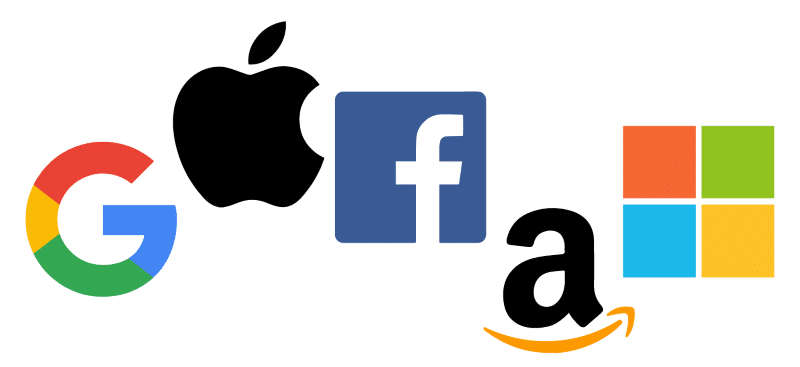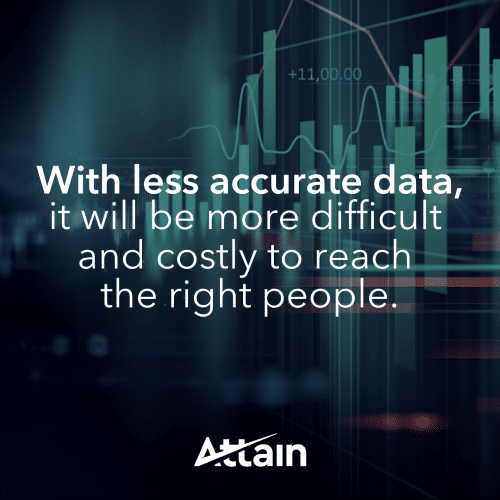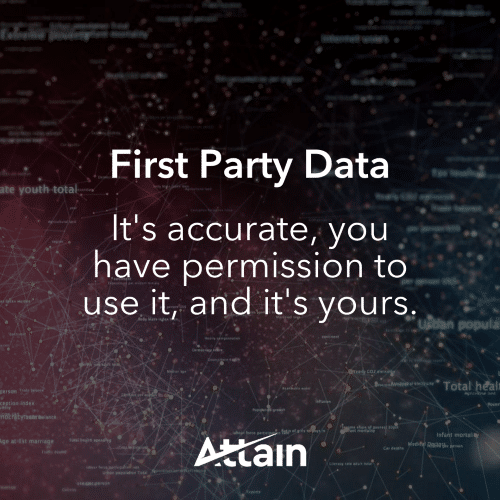More Than Ever, First Party Data Should Be at the Foundation of Your Marketing Strategy
A lot of hype (justifiably so) has been made about Apple’s recent privacy changes.
First, Facebook was in the firing line, and, more recently, email marketers are trying to figure how they’ll adapt to party not being able to track activity through invisible pixels.
So, what actually has happened? Why should you care? And what can you do about it?
Table of Contents
There’s a cold war on data going on
These changes are just the latest moves in the cold war on data going on around us. Apple, Facebook, Google, Microsoft, Amazon and many other big players are fighting for control over data –your data.

As a consumer, improved privacy is a great thing. Unfortunately, it has probably been a long time coming (slowed down by a general lack of awareness and laziness to update privacy settings proactively).
For business owners and marketers who rely on Facebook and online advertising channels that use third party data, the results haven’t been great.
What is third party data?
Essentially it is data provided by a third party (hence the name). It comes from many sources and is the data that you’re tapping into when you target your advertising on Facebook, for example.
One source of this data comes from apps tracking your activity. From this, they can build up a picture of who you are and what you’re interested in. Providing this data to Facebook helps advertisers(more accurately) target you with things you might be interested in.
And what has Apple done to it?
Most platforms allow you to opt out of tracking and having your information passed on to third parties. However, you’re typically opted in by default and have to explicitly opt out.
So, it’s no surprise that many people don’t bother.
What Apple has done is flip this around – requiring app developers to request (and receive permission) before tracking what you do.
And, not many people are keen to be tracked (early on, reports had this at less than 6%!).
Without this information, the third party data that Facebook and other platforms are using will be less accurate and, therefore, less valuable.

What does this mean for businesses?
For businesses that rely heavily on Facebook advertising to target potential customers, there will bean impact. With less accurate data, it will be more difficult and costly to reach the right people.
But, that has always been the challenge with third party data – it is the lowest form of data.
And, while it has its uses, it shouldn’t be the sole form of data you rely on.
Instead, your focus should be on collecting, protecting and maximising your first party data.
The importance of first party data
First party data is information you collect directly from your customers and your target market. It’s extremely accurate, you’ve got permission to use it (as long as it’s collected properly), and, most importantly, it’s yours.
That final point is a critical one.
The risk with Facebook and all these other platforms has always been that you don’t own them, and you don’t own the data associated with them.
Over the years, Facebook has changed the rules, and everyone has had to adapt.
When I started in digital marketing, pretty much everyone following your page would see your organic posts, and you could generate results without paying a cent. Now it’s a user pays platform, and you’ve got to spend money to make money.
In this case, Apple has changed the rules on Facebook, and marketers and business owners have been caught up in it.
This risk doesn’t mean you shouldn’t use these platforms, but it does highlight the need to have amore reliable source of data as the foundation of your marketing strategy.

Start using your first party data
There are many ways you can incorporate first party data in your marketing to increase personalisation and results.
The traditional, easiest, and most cost-effective way is through email.
You have a database of customers and a whole bunch of useful information about them.
Whether it is sending newsletters with interesting, value-added content, setting up automated campaigns that trigger based on their buying behaviour (ideal for ecommerce stores, for example),or sending them a gift voucher for their birthday – you can connect with your customers and contacts in a meaningful and effective way.
And, the ROI ($38 back for every $1 spent on email as a marketing channel) is pretty impressive.
But isn’t Apple taking a swing at emails too?
Yes, they are. By blocking the invisible pixels that email software, like MailChimp, uses to track opens, locations and online activity (by way of your IP address), some of the key metrics email marketers use will no longer be accurate.
How big of a problem is this?
Unlike the impact of the privacy changes on third party data, the effectiveness of your first party data isn’t diminished.
Your emails will still get there and be opened (you just might not know it).
However, you will have less of a picture of the effectiveness of your email campaigns, and it does remove information that can be used to enhance your first party data.
What this will do is make email marketers more focused on the end goal of their email campaigns and utilise metrics other than open rates to assess the campaign’s effectiveness.

The foundation of your marketing strategy
Events like Apple’s privacy changes are a great reminder that marketing is everchanging.
An overreliance on third party platforms, like Facebook, and third party data is a risk, and you have to be able to adapt as the rules change.
Something that has always remained constant is the importance of first party data.
In a world of increased privacy, investing in your first party data is a must.
Not only that, it should be the foundation of your marketing strategy. Its value in personalising your messaging, marketing activity, and customer experience is immense.
Also, because it’s your data and no one else’s, it’s part of your competitive advantage – if you choose to use it.
What first party data could you activate in your business, right now?

Jonathan Wrait
Marketing Account Director
M: 021 071 4143
E: jonathan@weareattain.com

